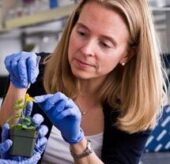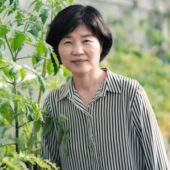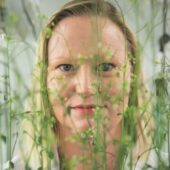In March, the ASPB Women in Plant Biology Committee asked you to nominate remarkable women who shape our field for recognition by the ASPB community. We recognize these 25 women to highlight their achievements and leadership, celebrate their impact in plant biology, and inspire future generations. We will continue to build a more equitable and inclusive plant biology community.
Distinguished Researchers

Anjali Iyer-Pascuzzi
Biotic Interactions: Plant-Microbe Pathogenesis
Dr. Anjali Iyer-Pascuzzi, leading an all-female lab at Purdue University, has achieved significant milestones in her academic career. She currently oversees the research endeavors of six PhD students focusing on plant pathology. Anjali’s research has been diverse and impactful, ranging from investigating the effects of spaceflight and simulated microgravity on plant defense responses in collaboration with NASA to unraveling the infection strategies of various plant pathogens, including Phyllachora maydis and Ralstonia solanacearum. Her work has been recognized and cited extensively, reflecting her profound contributions to the fields of plant biology and microbiology.
“Dr. Iyer-Pascuzzi is a great mentor and creates a supportive lab environment.”

Anne Fennell
Abiotic: Light & Temperature
Dr. Anne Fennell’s research on grapevine bud dormancy, cold hardiness, and chilling fulfillment has had significant impacts on the global grapevine research community. Her research focuses on Vitis riparia Michx., a north American species used in grapevine root stocks around the world. Anne has developed a large and diverse populations of intergenic crosses involving this species enabling genetic studies for various complex traits significant for grapevine production under stress. In addition, her group has developed genomic resources including a complete genome for a northern ecotype of this Native American species, that is used in breeding for cold hardiness. Her genuine care for the students and her willingness to go the extra mile in making sure students learn the latest and most practical information necessary are unique qualities that are highly appreciated by students. Anne strives to meet individuals where they are and open and enhance their interest in the world of plant science research. She maintains a diverse lab experience for undergraduates through postdocs with studies in physiology, genetics, genomics, and big data and emphasizes national and international collaborations. This vertical integration of lab members provides undergraduates an opportunity to see opportunities beyond an hourly job as team members move on to careers in higher education and industry. National collaborative grants provide all team members with training in team science in addition to their specific areas of research. Her research program in the perennial grapevine is grounded in basic plant biology and moves seamlessly from the grapevine DNA and RNA back to the field performance/phenotype to identify genotypes, genes, pathways, and genetic architecture which impact sustainable production of the grapevine. Recent research impacts include using an F2 population to identify molecular markers for root architecture and berry enological characters (malic acid, yeast assimilable nitrogen and grassy notes).
“Anne is an exemplary scientist and mentor who strives to collectively advance both the science and the people who do it.”
“Anne’s genuine care for her students and her willingness to go the extra mile in making sure students learn the latest and most practical information necessary is highly appreciated.”

Aruna Kilaru
Biochemistry & Metabolism
Dr. Aruna Kilaru’s career is marked by significant contributions to both research and mentorship, shaping the professional development of many. Dr. Aruna Kilaru’s career is distinguished by her groundbreaking research aimed at enhancing crop productivity through the modification of lipid metabolism for storage oil biosynthesis and stress responses. Her work delves into the intricate mechanisms underlying lipid synthesis and signaling, spanning biochemical, cellular, physiological, and molecular levels. Dr. Kilaru’s primary focus lies in elucidating the regulation of storage oil content and composition, alongside investigating lipid-mediated stress response pathways in plants. By leveraging a diverse array of cutting-edge tools, from scanning electron microscopy to “omic” approaches, she endeavors to unravel the complexities of plant lipid metabolism. Through her innovative research endeavors, Dr. Kilaru aims to provide crucial insights into developing stress-tolerant crops with improved oil content and overall yield, thus addressing pressing agricultural challenges. Dr. Kilaru’s impact extends far beyond her scientific endeavors. Her dedication to nurturing the growth of her students and her service to the American Society of Plant Biologists (ASPB) are commendable. Dr. Kilaru’s journey from a village in India to the United States serves as an inspiring example for women globally, showcasing the power of passion and determination in achieving success.
“Dr. Aruna Kilaru has made an indispensable contribution to my professional development. I extend my sincerest gratitude to Dr. Kilaru for her guidance and support.”
“A great leader is like the sun, lights your days but enlightens you through the darkest of nights.”

Barbara Demmig-Adams
Biochemistry: Photosynthesis & BioEnergy
Dr. Barbara Demmig-Adams is Professor of Distinction in the Department of Ecology & Evolutionary Biology at the University of Colorado at Boulder, USA. She is a David & Lucille Packard Fellow and member of Leopoldina (National Academy of Sciences of Germany, Austria, and Switzerland). Dr. Demmig-Adams is best known for her pioneering role in discovering that the carotenoids of the xanthophyll cycle serve in photoprotection of plants against damage from excess absorbed light. She also contributed to uncovering what limits the capacity of photosynthesis and how manipulation of this capacity may enhance photosynthetic organisms’ productivity and tolerance of challenging environments. Her recent work uses insight from plant ecophysiology to co-optimize nutritional quality and sustainability of novel food systems in the context of climate change. Together with her students, she also synthesizes literature on the benefits of plant-based nutrition (and other aspects of lifestyle medicine) for human wellness and health.
“Dr. Demmig-Adams is someone to look up to as a strong woman in STEM … to build my confidence … with continued support, constant kindness, and compassion.”

Dorothea Tholl
Biochemistry & Metabolism
Dr. Dorothea Tholl is a professor in the department of Biological Sciences at Virginia Tech. She earned her PhD from the Technical University of Braunschweig, Germany, and conducted postdoctoral research at the Max Planck Institute for Chemical Ecology prior to establishing her research program in the US. Her research is focused on the biosynthesis, evolution, and function of specialized metabolites, especially volatile organic compounds, in chemical interactions of plants and animals. She has elucidated key enzymatic steps in the metabolism of plant volatiles with roles in direct and indirect defenses above and belowground. More recently, her team has made investigations in the convergent evolution of volatile metabolism in plants and animals by exploring the biosynthesis of insect pheromones. Applied projects in her lab examine the metabolism of volatile aroma compounds and defense metabolites in root crops and common flavor constituents in spices and culinary herbs. She is also interested in the metabolic engineering of insect pheromones in trap plants or microbial systems to develop novel integrated pest management strategies. Dr. Tholl has enjoyed serving her research community as president of the Phytochemical Society of North America from 2021-2022 and as a member of The Plant Cell editorial board since 2020.
“Dr. Tholl is widely known as an engaged, supportive, and enthusiastic colleague and highly effective mentor for her students and postdocs. She deserves special recognition for her efforts.”

Jane Parker
Biotic interactions
Prof. Jane Parker’s career revolves around unraveling the intricate mechanisms of plant innate immunity, aiming to decipher key players and processes that enable plants to effectively combat attacking microbes while maintaining growth and physiological fitness. Jane is based at The Max-Planck Institute for Plant Breeding Research and is Associate Professor at the at the University of Cologne. Sheplays a pivotal role in advancing scientific knowledge and nurturing the next generation of researchers. Her groundbreaking research has revealed the existence of multiple layers of defense, with the EDS1 protein family and its partners identified as crucialdrivers of immune responses after pathogen recognition by host receptors. Jane’s contributions to the field are widely recognized. Additionally, her commitment to scientific excellence is evident through her active involvement in various societies, boards and editorial roles. Jane’s research achievements culminated in her election as a Fellow of The Royal Society, a member of The US Academy of Sciences, and several other esteemed scientific academies and societies.
“I really enjoy the outstanding breakthroughs of Dr. Parker.”

Janet Slovin
Genes & Genomes: Genetics
Dr. Janet P. Slovin’s illustrious career includes her pioneering research integrating molecular, biochemical, physiological, and genetic approaches to unravel plants’ fundamental mechanisms. She made significant strides in auxin regulation of plant development, identifying the first plant mutant in IAA levels and contributing to our understanding of the IAA biosynthetic pathway and turnover. Her other research achievements include proving the involvement of low molecular weight heat shock proteins in thermotolerance and, with others pioneering the assembly of the F. vesca genome sequence through one of the first “crowd-sourced” sequencing efforts. Her foresight and collaboration have provided invaluable genomic tools for the Rosaceae research community, cementing her legacy as a visionary in plant science. As a trailblazer for women in plant science, Slovin was instrumental in forming the Women in Plant Physiology/Biology within ASPB and fought for equality within the USDA, winning a significant EEOC case on discrimination. Her contributions extend to organizing the first Mid-Atlantic Plant Molecular Biology Society and participating in outreach activities.
“She was one of the true women pioneers.”
“A scientist’s scientist who cares about excellent research and the value women bring to science and society. ”

Joanne Chory
Signal Transduction & Hormone Biology
Joanne Chory has dedicated over 30 years to studying Arabidopsis thaliana, a small flowering mustard plant, using molecular genetics to explore how plants adapt their size, shape, and form to optimize growth and photosynthesis in various environments. By leveraging genetics, she has been able to enhance two crucial natural characteristics of plants: their root systems and their capacity to produce suberin—a carbon-rich polymer that is naturally resistant to decomposition. By enhancing a plant’s ability to capture and retain more carbon, Chory has pioneered the development of plants that not only help mitigate CO2 levels in the atmosphere but also improve soil quality and increase crop yields. Her passion for combating climate change through plant science underscores her belief in a collective global effort to address this worldwide challenge. Read more about her.
“Dr. Chory is one of the leading figures in modern plant biology research. Her lab has laid the foundation of multiple important research fields.”

Virginia Walbot
Development: Reproduction
Dr. Virginia Walbot and her team have been researching maize anther development since 2005. Notably, they demonstrated that the initial step in cell fate determination involves hypoxia triggering the specification of archesporial cells, which subsequently determine neighboring cells as somatic in anther primordia. They elucidated the roles of small secreted proteins and discovered the involvement of reproductive phasiRNAs at specific stages and in particular cell types. By investigating a wide range of cell fate mutants, they have systematically organized the timeline of steps in anther ontogeny. Recently, utilizing single-cell RNA-seq, they have meticulously documented the stages from archesporial cell development through to pollen maturation and the differentiation of each somatic cell type.
“Excellent scientist and teacher.”

Alessandra Devoto
Genes & Genomes: Gene regulatory networks & Signal Transduction
Professor Alessandra Devoto, a distinguished scientist with a deep-seated passion for plant molecular biology, has developed a significant career since completing her education at the University of Rome Sapienza, in Italy. After earning her BSc and MSc, she pursued a PhD in Plant Molecular Biology, which fueled her lifelong commitment to research. Since 2006, Prof. Devoto has been an influential figure at Royal Holloway University of London, where she leads groundbreaking research on plant responses to environmental stressors with an aim to enhance plant yield and adaptation. Her work, particularly in the area of jasmonates and their role in plant stress and defense mechanisms, has led to vital insights into plant growth regulation under stress conditions. Prof. Devoto has contributed extensively to the understanding of molecular pathways that can improve stress responses and has developed novel methods for analyzing phytopharmaceuticals and enhancing microbial processing of biomass. In addition to her research excellence, she is an acknowledged mentor of the next generation of scientists.
“Prof. Devoto’s tireless dedication to advancing plant stress biology and her unwavering commitment to nurturing the growth of young scientists have left an indelible mark.”
“Like a sturdy oak, Prof. Devoto stands tall, providing shade and shelter to those under her mentorship. Her legacy is not merely in research papers or accolades but in the flourishing minds she has cultivated.”

Sona Pandey
Signal Transduction & Hormone Biology
Dr. Sona Pandey’s group focuses on how plants impact and respond to their surroundings using examples from species ranging from mosses and model plants such as Arabidopsis to crops such as soybean and sorghum. At the mechanistic level, the group studies a class of conserved signaling proteins, the heterotrimeric G-proteins (G-proteins) which control developmental and signaling pathways regulating stress responses and yield in plants. In addition to being an accomplished researcher, Sona has a reputation in and beyond her lab as an excellent mentor. She led the Danforth Center REU program for many years, mentoring undergraduates annually and increasing DEI in the field of plant sciences.
“Sona has been a tireless leader, establishing and overseeing an excellent NSF-REU program, mentoring students, advancing equity, inclusion, and women’s issues and pursuing impactful science.”
“Sona is one of the most compassionate and knowledgeable mentors I have been fortunate to work with.”
“I wish to become a scientist and a human like Dr. Pandey.”
“Dr. Pandey’s courage in facing adversity has been an inspiration for me and others to pursue our goals.”
Mid-Career Researchers

Carolyn Rasmussen
Cell Biology: General
Research in the Rasmussen lab is focused on understanding how plant cell divisions are oriented and how division plane positioning influences plant growth and development. In addition, Dr. Rasmussen is committed to mentoring and providing research opportunities to students historically excluded from STEM. She directs the undergraduate REU Summer program at the University of California-Riverside. In addition, Dr. Rasmussen has contributed to the plant biology community through service on several committees and membership in external scientific societies.
“Dr. Rasmussen is an excellent researcher and highly deserves recognition for inspiring others.”

Tessa Burch-Smith
Cell Biology
Dr. Tessa Burch-Smith has made significant strides in the field of plant biology, particularly in understanding intercellular communication through plasmodesmata in plant cells. Her research has expanded the knowledge base of how plasmodesmata function. Dr. Burch-Smith’s recent scholarly contributions include exploring the role of plasmodesmata in defense responses in Nicotiana benthamiana, as well as investigating the mechanisms of redox regulation in cell-to-cell communication, particularly in the context of viral spread within plant tissues. Each of these studies not only advances our understanding of plant biology but also underscores the complexity and importance of intercellular communication in plant resilience and adaptation. Beyond her research, Dr. Burch-Smith is lauded for her commitment to mentoring, particularly focused on supporting underrepresented minorities and individuals with disabilities in STEM fields. Her service to the plant biology community is extensive, including roles such as chair of the Science Policy Committee of ASPB, and membership on various editorial boards and conference organizing committees. This well-rounded professional portfolio showcases Dr. Burch-Smith as a dedicated scientist and mentor, making her a distinguished figure in plant biology and an exemplary leader.
“For her groundbreaking work in the field of plasmodesmata and her tireless efforts to make the pursuit of scientific careers accessible to all.”

Patricia Baldrich
Genes & Genomes: Gene Regulation & Transcriptional Networks
Dr. Patricia Baldrich’s work focuses on small RNAs in plants, ranging from creating atlases of small RNAs in potatoes to detecting them in rice samples and identifying their presence in Arabidopsis apoplastic fluid. She investigates their role in gene expression regulation and plant development, with implications for biotechnology in hybrid plant improvement. At the core of Patricia’s research is the quest to unravel the mechanisms governing gene expression regulation and plant development through the lens of small RNAs.
“Dr. Baldrich opened my mind to the career possibilities in science that I had never considered before. She is incredibly dedicated to making sure those around her are promoted with her, and is an amazing advocate for her mentees and employees.”

Rachel Egger
Development: Reproduction
Rachel Egger is an incredible researcher and mentor, her publication and patent record is stellar, and she leads the Reproductive Biology team at Syngenta seeds research. Recent studies by Egger and colleagues have explored innovative techniques such as cyto-swapping post haploid induction, which is critical for developing elite, transformable haploid inducers in maize. Other research delves into the application of a pathogen Trojan horse approach to manipulate maize anther cell behavior, offering insights into the cellular mechanisms underlying pre-meiotic anther development and male fertility, and establishing a framework for evaluating developmental defects at the cellular level, using both morphological and molecular data across various maize anther mutants. She has mentored students at Maize Meetings for several years and continues to connect Academia with Industry. She is a constant advocate for others.
“Rachel is a stellar researcher and mentor, connecting industry with academia and advancing women in the workplace.”

Aardra Kachroo
Biotic Interactions: Plant-Microbe Immunity
Dr. Aardra Kachroo’s research aims to understand the interconnections between primary metabolic and defense signaling pathways while addressing immediate problems in agriculture. She utilizes a combination of host plants and pathogens to do both. The current focus in her lab is to understand the molecular underpinnings of a specific systemic signaling mechanism called systemic acquired resistance (SAR). When activated, SAR provides broad spectrum immunity at the whole plant level and can exhibit limited transgenerational transmission as well as to neighboring individuals. Her group is studying the overlap between SAR signaling with another recently identified root-shoot-root signaling mechanism that regulates the associations between legumes and nitrogen-fixing rhizobacteria. In addition to her research, Aardra Kachroo is both an advocate for and a mentor to others. She serves on the board of the Kentucky Association of Professional African American Women, and she served as President of the Bluegrass Indo-American Society, and as a Program Director at the National Science Foundation. She also leads a biotech company that develops sustainable and environmentally friendly pest management products for plants.
“Aardra Kachroo’s research at the University of Kentucky focuses on unraveling the molecular mechanisms of plant immunity. Using molecular biology and genomics, she explores how plants recognize and defend against pathogens, offering insights crucial for enhancing crop protection and global food security.”
“I am privileged to receive guidance from a remarkable woman who has truly been a beacon of inspiration on my journey.”
“Aardra serves selflessly to empower Women in Science and Plant Biology”

Carrie Wu
Whole-Plant: Environmental & Eco physiological
Dr. Carrie Wu is a plant evolutionary ecologist who studies how the environment shapes the genetic structure and evolutionary trajectory of natural plant populations. Her research interests broadly encompass plant evolutionary ecology, local adaptation in natural plant populations, the invasion trajectory of introduced species, hybridization, and plant responses to a rapidly changing climate.
“Dr. Carrie Wu is a phenomenal role model and mentor. She was instrumental in shaping my perspective of science and nurturing my curiosity.”
“Dr. Wu remains a large reason I had the courage to pursue a career in plant biology as a female scientist.”

Jeongim Kim
Biochemistry: Specialized Metabolites
Dr. Jeongim Kim is an assistant professor in the Horticultural Sciences Department and a member of the Plant Molecular and Cellular Biology (PMCB) graduate program. She earned her PhD at Purdue University, focusing on auxin biosynthesis and plant abiotic stress physiology. During her post-doctoral tenure at Purdue, she delved into phenylpropanoid biosynthesis, contributing significantly to several projects aimed at enhancing biofuel production. Dr. Kim’s research encompasses a broad spectrum, from the nutritional value of muscadine genotypes to the modulation of phenolic compounds in various plant varieties. Her recent investigations shed light on topics such as aldoxime metabolism, antioxidant capacity in lettuce, and the spatio-temporal control of phenylpropanoid biosynthesis. With a wealth of knowledge and a dedication to advancing plant science, Dr. Kim continues to make impactful contributions to her chosen field, plant natural products, and their abilities to enhance nutritional value or plant resilience.
“Dr. Jeongim Kim has established herself as an outstanding scientist while remaining unflinchingly kind and compassionate with her mentees. She mentored brilliantly these students throughout their PhD and led them toward successful careers in academia.”

Katie Murphy
Phenomics
Dr. Katherine Murphy, a Principal Investigator and Director of Phenotyping at the Donald Danforth Plant Science Center, uses high-throughput, image-based phenotyping to study how plants respond to environmental stressors, with a focus on maize and heat stress.
“What I admire most about Katie is her remarkable ability to communicate science exceptionally well. She skillfully conveys scientific concepts on multiple platforms that reach beyond the plant science community.”

Lucia Strader
Development: Vegetative
Dr. Lucia Strader’s research delves into the intricacies of normal plant morphogenesis and environmental responses, which necessitate the integration of multiple signals to modulate auxin responsiveness, biosynthesis, transport, and storage forms. As a critical plant hormone, auxin governs both cell division and expansion, thereby orchestrating numerous developmental events and environmental responses. Dr. Strader’s investigations are centered around gaining a molecular understanding of auxin signaling, auxin homeostasis, and the crosstalk between auxin and other hormones. By unraveling these molecular intricacies, her research aims to provide insight into the strategies employed by plants to adapt their growth in response to various environmental factors.
“Lucia is an incredible mentor and researcher who has made exemplary contributions to the auxin biology field.”

Ru Zhang
Abiotic: Light & Temperature
Dr. Ru Zhang’s research is dedicated to understanding how plants respond to high temperatures by studying green algae, with a particular focus on photosynthesis. Dr. Zhang’s lab investigates how high temperatures impact photosynthesis, aiming to identify the most heat-sensitive components of this process. Currently, her research employs Chlamydomonas, an excellent model organism for understanding how photosynthetic cells react to elevated temperatures. With the growing threat of climate change exacerbating heat stress on crops, Dr. Zhang’s work holds significant importance in enhancing crop heat tolerance, ultimately contributing to global food security. Additionally, Dr. Zhang is recognized for her mentorship and leadership qualities, actively fostering the growth and development of individuals in her lab. Beyond her lab, Dr. Zhang actively contributes to various organizations at the Danforth Center, including the International Women in Science Hub.
“Ru Zhang is an excellent mentor that truly goes above and beyond to build up the people in her lab.”
“Dr. Zhang has great leadership qualities in addition to being a passionate plant science researcher. She is a role model.”
Early Career Researchers

Pallavi Singh
Biochemistry: Photosynthesis & BioEnergy
Since September 2022, Pallavi has been a Lecturer at the University of Essex (UK). Her research group focuses on studying various aspects of water use strategies in crop plants. The Singh lab aims to enhance photosynthetic productivity by concentrating on the complementary requirement to balance plant water supply with carbon gain, maximizing water use efficiency. The overarching goal of their research is to develop more water-efficient crops and promote climate-smart agriculture in the face of changing climate. Pallavi Singh has revolutionized the understanding of plant grafting by discovering a pluripotent tissue that enables grafting in monocotyledons like bananas and oil palms, which can help combat diseases and reduce deforestation. Her research on C4 photosynthesis has identified how C4 genes incorporate light-responsive elements, potentially enabling the enhancement of crop yields through genetic engineering. Singh has also found significant intraspecific variation in C4 traits within Gynandropsis gynandra, paving the way for the introduction of these traits into C3 crops. Additionally, her work has elucidated the MPK3-SUB1A1 module’s role in rice submergence tolerance, offering critical insights for developing flood-resistant rice varieties.
“Originating from modest beginnings, she began her research journey in India, and now stands as a paragon of research excellence and a source of inspiration for women of color in the UK academic landscape.”

Seema Sahay
Biochemistry: Photosynthesis & BioEnergy
Dr. Seema Sahay is an exceptional researcher whose career trajectory showcases resilience and dedication. She earned her degree at Aligarh Muslim University and subsequently served as an assistant professor in Mexico before transitioning to the United States, where she continued her research endeavors amidst the challenges posed by the pandemic. Dr. Sahay’s notable contributions include mapping genes that govern variation in photosynthetic performance within plant populations, shedding light on crucial mechanisms underlying plant adaptation to environmental stressors. Her research encompasses diverse areas, including genetic control of photoprotection, modulation of gene expression under stress conditions, and the effects of biostimulants on plant resilience. Dr. Sahay’s work significantly advances our understanding of plant biology and holds promise for enhancing crop performance and resilience in the face of changing environmental conditions.
“Dr. Sahay has overcome language, cultural, economic, and religious barriers to move forward our understanding of how natural genetic diversity governs photosynthesis in plants.”

Sreya Das
Abiotic: Light & Temperature
Sreya Das is deeply engaged in investigating the intricate crosstalk between temperature and light signals and its impact on the regulation of plant growth and development, with a primary focus on utilizing Arabidopsis as a model organism. Her research interests span a wide range of areas, including light and temperature signaling in plants, stress biology, plant developmental biology, and epigenetics. Through her studies, Dr. Das explores how plants modulate gene expression to influence essential processes such as cell elongation, flowering time, hormone metabolism, photoreceptor sensing, and overall yield under diverse light and temperature conditions, offering valuable insights for enhancing crop performance. Furthermore, Dr. Das’s contributions extend beyond her scientific endeavors. As a senior PhD student, she has demonstrated exemplary dedication, passion, and innovation, earning recognition as the ‘Best Collaborator’ within her lab. Additionally, Sreya actively engages in volunteer work and holds leadership positions in student-led organizations focused on community outreach and empowerment, exemplifying her commitment to making a positive impact beyond academia.
“Nurturing not only seeds, but women in plant biologists also develop roots of scientific discoveries and their contributions that blossom into scientific understanding and enriching a brighter future for all.”
“I am fortunate to have a colleague whose dedication, passion, and innovation embody the spirit of inspiring women.”

Surbhi Kumawat
Genes & Genomes: Genome Editing
Surbhi Kumawat is a plant functional geneticist whose career focuses on the molecular basis of plant traits through the integration of quantitative genetics and genome editing. Her early work during graduate studies explored the molecular mechanisms of silicon uptake in plants. Currently, she is delving into the evolutionary dynamics of plant telomeres, using Mimulus as a model to understand why plant telomeric sequences diverge significantly from the conserved sequences found in vertebrates and Arabidopsis. Her research has also contributed significantly to genomic studies, as evidenced by her publications on topics ranging from the role of aquaporins in nutrient transport and stress responses to the implications of telomerase RNA transposition in telomere evolution. Through her work, Surbhi aims to innovate agricultural practices by developing resilient and high-yielding crop varieties, contributing to sustainable food systems and global food security.
“Surbhi has done very impressive research so far at such a young age.”
“In addition to her research, which is impressive, Surbhi is also a contributor to her community.”
____________________________


Thanks for sharing this list of inspiring colleagues. Very refreshing. One can’t, however, fail to notice the total lack of anyone in plant systematics, a symptom of the progressive abandonment of organismal biology in our academic instructions, which we will one day regret.
Agreed; I had the same thoughts…, slightly broader framing, to include evolutionary biology in general
Regarding the comments of Pete Lowry and Jonathan Wendel: we agree! As the committee selected from nominees only, we could not broaden beyond the areas recommended. The Women in Plant Biology Committee encourages all disciplines to nominate their inspiring women colleagues when we re-host this event. In the meantime, please feel free to add kudos to your female plant biology colleagues in the comments!